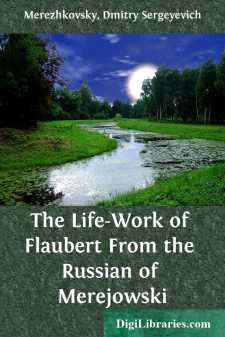Categories
- Antiques & Collectibles 13
- Architecture 36
- Art 48
- Bibles 22
- Biography & Autobiography 813
- Body, Mind & Spirit 142
- Business & Economics 28
- Children's Books 15
- Children's Fiction 12
- Computers 4
- Cooking 94
- Crafts & Hobbies 4
- Drama 346
- Education 46
- Family & Relationships 57
- Fiction 11828
- Games 19
- Gardening 17
- Health & Fitness 34
- History 1377
- House & Home 1
- Humor 147
- Juvenile Fiction 1873
- Juvenile Nonfiction 202
- Language Arts & Disciplines 88
- Law 16
- Literary Collections 686
- Literary Criticism 179
- Mathematics 13
- Medical 41
- Music 40
- Nature 179
- Non-Classifiable 1768
- Performing Arts 7
- Periodicals 1453
- Philosophy 64
- Photography 2
- Poetry 896
- Political Science 203
- Psychology 42
- Reference 154
- Religion 513
- Science 126
- Self-Help 84
- Social Science 81
- Sports & Recreation 34
- Study Aids 3
- Technology & Engineering 59
- Transportation 23
- Travel 463
- True Crime 29
The Life-Work of Flaubert From the Russian of Merejowski
Description:
Excerpt
FLAUBERT I
Balzac in one of his novels gives utterance to the following thought: "Genius is a terrible disease. Every writer of genius cherishes in his heart a monster which devours all his emotions as soon as he gives birth to them. Which is to be the conqueror? Will the disease vanquish the man, or the man the disease? He must be a great man who can establish a perfect equilibrium between his genius and his character. Unless the poet be a giant, unless he be possessed of the shoulders of a Hercules, he must inevitably remain bereft of heart, or else bereft of talent."
Here, unfortunately, Balzac breaks off his dissertation, and does not state what in his opinion is the cause of this disease of genius, why the development and power of the artistic personality stand in many respects in inverse ratio to the development and power of the moral type, or on what fundamental ground depends that primary antagonism between these two elements which is so often to be observed in the daily experience of life. Every one knows, for instance, that writers of talent, artists or musicians, are in the majority of cases men of the most unpractical nature, that their eccentricities and irresponsibility verge not uncommonly on complete moral disintegration, that they are bad fathers of families and bad husbands, and that while expressing great sensitiveness in the forcible language of their works, they very often show themselves in real life to be at heart hard and unfeeling egotists. An enquiry into the origin of the causes responsible for the deep contrast which exists between the æsthetic and ethical points of view, between the artist and the man, between genius and character, would undoubtedly open up one of the most interesting chapters in the history of creative psychology.
Let us take, as an illustration of our thesis, the tragic scene of the destruction of Laocoon, as described in the Æneid. Picture the horror and anguish with which the citizens of Troy witness the seizure and suffocation of Laocoon and his children by the gigantic serpents. The onlookers are filled with terror, grief, and a desire to save the unfortunate victims. In bringing out the psychic differences of constitution among the crowd, the crucial moment of action plays a most important rôle, developing the instinct of self-preservation among the more timid ones, or the efforts of the more manly to lend their aid. Then imagine a sculptor moving about in this wavering and undecided crowd, and studying the terrible tragedy which is being enacted before his eyes as a fit theme for a future work of art. He alone remains an unmoved spectator amid the general confusion, lamentation, cries, and prayers. His moral instincts are all absorbed in an intense æsthetic curiosity. Tears would hinder his vision, and he keeps them sternly back, because it is imperatively necessary for him to see every form, every outline of the muscles distorted under the crushing force of the snakes' huge coils. Every detail of the picture which in the others awakens loathing and terror, evokes in him a joy that is outside the ken of other men....


